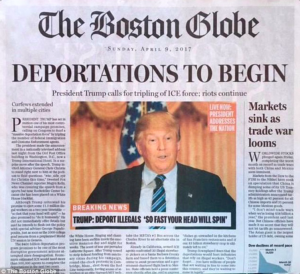A model member of the Massachusetts Institute of Technology community, a hardworking go-getter who regularly works 16-hour days to support his family (which includes two daughters—both U.S. citizens—and a wife who is eight months into a high-risk pregnancy), is likely to be deported this summer. Does he have a criminal record? No. Is he a leech on the public welfare system? No. Francisco Rodriguez not only works full time as a custodian at MIT but also runs a carpet-cleaning company, and he pays income taxes on both jobs.
Did he lie to the government and try to sneak in? No; he applied for asylum when he moved here from El Salvador just over a decade ago. A mechanical engineer in his native country, his success made him a target of gangsters who shook him down and threatened him with murder if he didn’t pay them even more. He has been up-front with the Department of Homeland Security all along the way. The U.S. would not give him asylum, but until recently they would not begin deportation proceedings, either, since it was clear that Francisco was not a risk to our nation—indeed, he was a taxpayer and a job-creator, he supported his family and was active in his children’s school, his church and his union. But on July 13, he will meet with representatives of ICE, possibly for the last time before he is forced to leave his family, his job, his business—everything—behind in the U.S., the country he has served so well for over a decade.
So what changed? Our nation is now led by a man who sees all born outside of our borders as lesser beings, and he sees those who were born in countries below our southern border as especially dangerous and worthless, with inherent violent and immoral tendencies, no matter how clearly the facts prove otherwise.
Francisco Rodriguez wasn’t targeted for deportation because he’s a danger to society; he was chosen because his honesty made him easy to find, and his lack of criminality made him highly unlikely to cause a fuss when he was singled out for removal from his home, his family, his job and his community. If Francisco is deported, he and his wife will not be allowed to travel between the U.S. and El Salvador to visit each other for at least ten years.
The true cost of Trump’s anti-immigrant, anti-refugee policy is this: families are torn apart; honest and hardworking people are forced to give up everything to go to countries where their safety is at risk; taxpayers are taken off the rolls, so the IRS loses out on revenue; and formerly independent families are forced to ask for assistance during and after family crises (in this case a high-risk birth with no father present—a crisis completely manufactured by the U.S. government).
The knock-on effect of sweeping deportations to families, businesses, tax rolls and our culture in general is enormous and devastating. It will soon be felt strongly in the business world and will result in lower income tax revenues as well. The service and construction sectors rely heavily on undocumented labor and are fearful of the increasing costs of hiring citizens who want greater income and shorter hours. The agriculture sector is already feeling the pinch and is worried about how they’ll manage to find enough farm workers to bring in their crops. They can’t find enough citizens willing to work long hours in seasonal agricultural jobs in the blistering harvest-season heat, even as wages rise. Produce will rot before it can be picked and distributed when there are not enough workers to go around. Will our supposedly business-savvy president recognize the folly of his fear and hate then? It is doubtful.
These misguided policies fuel our growing xenophobia and will take a huge economic and emotional toll on our nation. It is never in our country’s interests to treat good, honest, hardworking people like criminals because of an accident of birth. Our moralistic pronouncements about the greatness of our country are hollow when we use our might to destroy lives, to vilify honorable people and to dismantle our social compact out of unearned self-regard based on birth and not innate worth. We harm ourselves as well as others when we let our fears and prejudices overcome reason, mercy and human decency.


